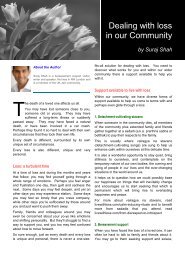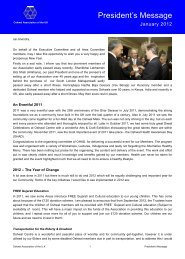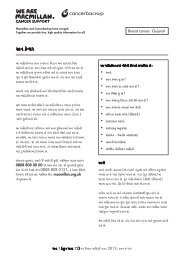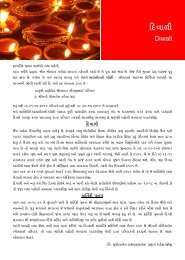First Ever E-Magazine | December 2011 | www ... - Oshwal Centre
First Ever E-Magazine | December 2011 | www ... - Oshwal Centre
First Ever E-Magazine | December 2011 | www ... - Oshwal Centre
- No tags were found...
You also want an ePaper? Increase the reach of your titles
YUMPU automatically turns print PDFs into web optimized ePapers that Google loves.
Who looks after Carers?by, Varsha DodhiaCarers – members of the family and friends whocare for people with disability and long termconditions"When dad took ill it was a complete shock toour family but we just had to manage and geton with it," explained Jayshree. "I was a carerfor seven years before I ever knew aboutsupport or services available for Carers – itwas a very demanding and hard journey”.Carers take on a lot of responsibility and at times itcan be a l onely place, with little support andprofessional training. Husband and wife oftencannot go out at the same time as one of them needs tobe at home. There are examples of young people aged 8or 10 who take on caring roles for their parents. Here aresome facts about Carers which many people do notknow:far short of the national minimum wage of £5.93 perhour (<strong>2011</strong>-2012 figures).Carers UK, a c harity providing support in this areaexplains: “The number of people providing round theclock care has increased by 50% in recent years. Thesocial care system is in crisis and severely underfunded.This has devastating consequences for older anddisabled people and a knock-on effect for carers whohave no option but to fill the gap. Many families areoutside the social care system altogether and get no helpwhatsoever and others face a constant battle for the mostmeagre of services. Carers are paying the price with theirhealth, income and careers”.In London, the Census data shows that the South Asiancommunity has the largest percentage of Black Asian andMinority Ethnic Carers, Indian Carers being the highestpercentage among these groups. For us, caring is anatural role in our lives, and we need to understand thesystem and s upport services that are available to us asindividuals and as a community.1 in 8 adults in the UK (around six millionpeople) are carers.• If we estimate that there are 25,000 <strong>Oshwal</strong>s in theUK and we have more than 4,000 people withdisability and/or long term condition then we musthave over 3,000 people who can be called Carers.That is a significant number of people.• A lot of our community Carers are not recognised onany official lists within the Local Authority where theylive. As a result, they do not get the support serviceswhich Carers desperately need and can benefit from.Carers save the economy £119 billion peryear, an average of £18,473 per carer.• Over 3 million people juggle care with work. Howeverthe significant demands of caring mean that 1 i n 5carers are forced to give up work altogether.• The main carer's benefit is £55.55 per week for aminimum of 35 hours, equivalent to £1.58 per hour -Among the London BoroughsBarnet has a good Carers centre in North Finchley. Brenthas a centre in Wembley, Harrow a centre in NorthHarrow and Hillingdon in Uxbridge. All Carers shouldhave some training regarding first aid, lifting and handling,health and safety. Carers also need advice on managingtheir own finances, understanding how best to help theperson they care for, sometimes they may need advocacyservice if they are facing difficulties in getting what theyneed.<strong>Oshwal</strong> News E-<strong>Magazine</strong> of the O.A.U.K. 11 <strong>December</strong> <strong>2011</strong> Edition
















